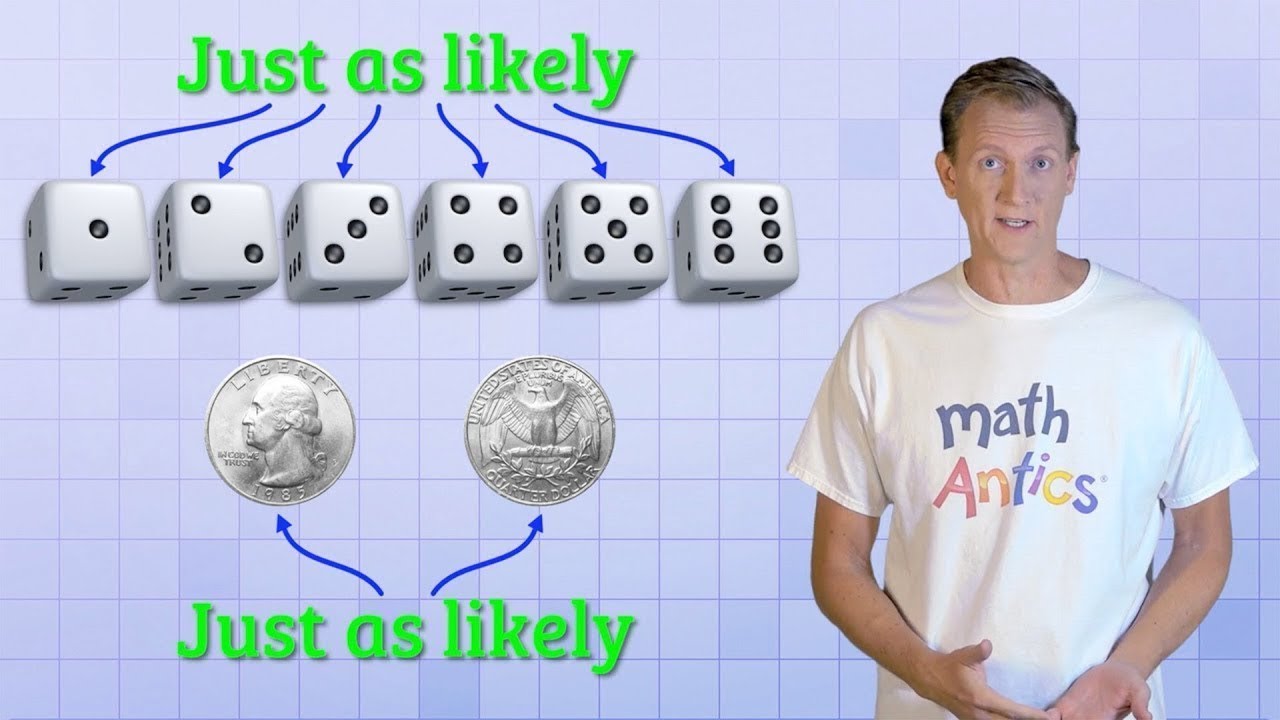
Understanding Probability
Interactive Video
•
Mathematics
•
6th - 10th Grade
•
Practice Problem
•
Easy
Standards-aligned

Wayground Content
Used 6+ times
FREE Resource
Enhance your content in a minute
10 questions
Show all answers
1.
MULTIPLE CHOICE QUESTION
30 sec • 1 pt
What is the probability of flipping heads with a fair coin?
1/4
1/2
1/3
3/4
Tags
CCSS.7.SP.C.7A
2.
MULTIPLE CHOICE QUESTION
30 sec • 1 pt
What does a probability of 1 indicate?
The event is impossible
The event is unlikely
The event is certain to happen
The event has a 50% chance of happening
Tags
CCSS.7.SP.C.5
3.
MULTIPLE CHOICE QUESTION
30 sec • 1 pt
What does a probability less than one-half indicate?
The event is impossible
The event is certain
The event is likely
The event is unlikely
Tags
CCSS.7.SP.C.5
4.
MULTIPLE CHOICE QUESTION
30 sec • 1 pt
How is probability commonly expressed besides fractions?
Exponents
Square roots
Integers
Decimals and percentages
Tags
CCSS.7.SP.C.5
5.
MULTIPLE CHOICE QUESTION
30 sec • 1 pt
What is the probability of rolling a 3 on a standard die?
1/3
1/2
1/4
1/6
Tags
CCSS.7.SP.C.7A
6.
MULTIPLE CHOICE QUESTION
30 sec • 1 pt
Why might results from a small number of trials not match expected probabilities?
All trials are biased
Due to calculation errors
Randomness leads to unpredictable short-term results
Because of the law of averages
7.
MULTIPLE CHOICE QUESTION
30 sec • 1 pt
How can you increase the accuracy of experimental probability results?
By guessing the outcomes
By changing the probability
By conducting fewer trials
By conducting more trials
Access all questions and much more by creating a free account
Create resources
Host any resource
Get auto-graded reports

Continue with Google

Continue with Email

Continue with Classlink

Continue with Clever
or continue with

Microsoft
%20(1).png)
Apple
Others
Already have an account?
Similar Resources on Wayground

10 questions
MATHS 10 REVISION 3
Quiz
•
9th - 10th Grade

11 questions
Propiedades de Logaritmos
Quiz
•
10th Grade

11 questions
Тест 3 Вектори
Quiz
•
9th - 10th Grade

10 questions
Logaritma 2
Quiz
•
10th Grade

10 questions
Quadratics: Difference of squares
Quiz
•
5th - 7th Grade

15 questions
Math Practice Paper Booklet A (16 July)
Quiz
•
6th Grade

10 questions
Geometry: Reflections & Translations
Quiz
•
5th - 6th Grade

10 questions
คณิตศาสตร์ ป.6
Quiz
•
1st Grade - University
Popular Resources on Wayground

15 questions
Fractions on a Number Line
Quiz
•
3rd Grade

20 questions
Equivalent Fractions
Quiz
•
3rd Grade

25 questions
Multiplication Facts
Quiz
•
5th Grade

22 questions
fractions
Quiz
•
3rd Grade

20 questions
Main Idea and Details
Quiz
•
5th Grade

20 questions
Context Clues
Quiz
•
6th Grade

15 questions
Equivalent Fractions
Quiz
•
4th Grade

20 questions
Figurative Language Review
Quiz
•
6th Grade
Discover more resources for Mathematics

20 questions
Exponents
Quiz
•
6th Grade

22 questions
distributive property
Quiz
•
7th Grade

15 questions
Distributive Property & Review
Quiz
•
6th Grade

20 questions
Writing Algebraic Expressions
Quiz
•
6th Grade

20 questions
Ratios/Rates and Unit Rates
Quiz
•
6th Grade

20 questions
Writing and Graphing Inequalities
Quiz
•
6th Grade

15 questions
Product of Powers Property A1 U7
Quiz
•
8th Grade

20 questions
Laws of Exponents
Quiz
•
8th Grade
